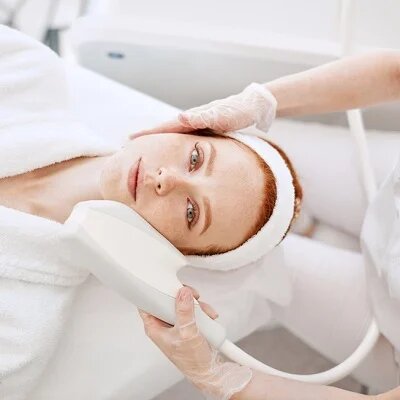Laser Skin Resurfacing for Hyperpigmentation: What You Need to Know
Dealing with hyperpigmentation can be frustrating, especially when topical treatments fall short. For those in search of more effective solutions, Laser Skin Resurfacing in Muscat offers a promising option. By targeting uneven pigmentation with precision, this advanced treatment helps in revealing smoother, more even-toned skin. Whether you're considering it to correct sun damage, melasma, or post-inflammatory pigmentation, understanding the process, benefits, and aftercare is essential. In this guide, we will dive deep into the key aspects of laser skin resurfacing and why it's an excellent option for hyperpigmentation.

What is Laser Skin Resurfacing?
Laser skin resurfacing is a cosmetic procedure that uses targeted laser technology to improve the texture and tone of the skin. This treatment works by removing the outer layers of skin, which are often damaged or discolored, and stimulating collagen production in the deeper layers. For individuals struggling with hyperpigmentation, this method is particularly effective in reducing dark spots and evening out the complexion.
Types of Laser Skin Resurfacing for Hyperpigmentation
When seeking Laser Skin Resurfacing in Muscat, it’s important to understand the different types of lasers used in this treatment. Here are the two main categories:
Ablative Lasers
Ablative lasers, such as CO2 and Erbium lasers, are more intense and work by removing layers of skin. They are highly effective for severe hyperpigmentation but require longer recovery times. Patients often experience redness and peeling for up to two weeks following treatment.
Non-Ablative Lasers
Non-ablative lasers, such as Ndand Fraxel lasers, are less invasive, as they work beneath the skin's surface to promote collagen production without damaging the outer layer. These lasers are ideal for individuals with mild to moderate hyperpigmentation and require minimal downtime.
Benefits of Laser Skin Resurfacing for Hyperpigmentation
The primary benefit of undergoing Laser Skin Resurfacing in Muscat is its ability to target and reduce hyperpigmentation. Here are some additional benefits that make it a popular choice:
- Precision Targeting: Laser technology can precisely target areas of pigmentation without affecting the surrounding skin.
- Stimulates Collagen Production: By promoting collagen growth, laser resurfacing helps improve the skin’s texture and reduce fine lines, resulting in a more youthful appearance.
- Minimal Downtime (With Non-Ablative Lasers): For those opting for non-ablative treatments, the recovery time is minimal, allowing individuals to return to their daily routines quickly.
How Laser Skin Resurfacing Works for Hyperpigmentation
Laser skin resurfacing works by delivering concentrated light beams into the skin. These beams either remove the top layer of skin or heat the layers underneath, promoting the regeneration of new skin cells. For hyperpigmentation, the laser breaks down the excess melanin (the pigment responsible for dark spots), allowing the body to naturally eliminate it over time.
Pre-Treatment Preparation
Before undergoing Laser Skin Resurfacing in Muscat, there are some preparatory steps that ensure optimal results:
- Avoid direct sun exposure and use a high-SPF sunscreen.
- Discontinue any retinoid or exfoliating products a few weeks prior.
- Stay hydrated and keep the skin moisturized.
Post-Treatment Care
Proper aftercare is crucial to maximizing the results of laser skin resurfacing. This includes:
- Applying soothing creams and moisturizers to minimize redness and irritation.
- Using gentle, non-irritating skincare products.
- Avoiding sun exposure and always wearing sunscreen.
Side Effects and Risks
While Laser Skin Resurfacing in Muscat offers impressive results for hyperpigmentation, it is essential to be aware of potential side effects. Common side effects include:
- Redness and swelling
- Temporary changes in skin texture
- Peeling or flaking
- Increased sensitivity to sunlight
In rare cases, individuals may experience scarring, infection, or worsening of hyperpigmentation, particularly if the laser is not administered properly. This is why it’s crucial to choose a qualified, experienced professional for the procedure.
Choosing the Right Specialist in Muscat
When considering Laser Skin Resurfacing in Muscat, it’s essential to choose a board-certified dermatologist or licensed laser technician who has experience treating hyperpigmentation. Not all lasers are suitable for all skin types, so consulting with an expert can help you determine the best treatment option for your skin.
Factors to Consider:
- The type of laser best suited for your skin and pigmentation level.
- The expertise of the clinic or technician.
- The overall cost of treatment and how many sessions you may require.
Who is a Good Candidate for Laser Skin Resurfacing?
Laser skin resurfacing is generally safe for most individuals, but it's particularly beneficial for those dealing with specific skin concerns like hyperpigmentation, age spots, and sun damage. However, the following individuals may be the best candidates:
- People with light to medium skin tones (as darker skin tones may be at higher risk for complications like post-inflammatory hyperpigmentation).
- Those with realistic expectations and a commitment to proper skincare post-treatment.
- Individuals not currently taking medications that increase skin sensitivity, such as Accutane.
Final Thoughts on Laser Skin Resurfacing in Muscat
Laser Skin Resurfacing in Muscat offers a highly effective solution for treating hyperpigmentation. By utilizing advanced laser technology, individuals can achieve a more even skin tone, reduce dark spots, and promote collagen production for a youthful, radiant glow. While there are some risks involved, choosing a qualified professional and adhering to pre- and post-treatment care guidelines can help ensure a smooth and successful outcome. Whether you’re dealing with melasma, sun damage, or acne scars, laser skin resurfacing is a powerful tool in the battle against hyperpigmentation.
